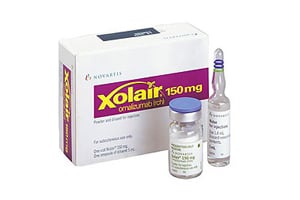 NICE is poised to recommend Novartis’ Xolair as an add-on treatment option for severe chronic spontaneous urticaria (CSU) in adults after the company was able to provide more information on the drug’s use.
NICE is poised to recommend Novartis’ Xolair as an add-on treatment option for severe chronic spontaneous urticaria (CSU) in adults after the company was able to provide more information on the drug’s use.
Xolair (omalizumab) was backed in final draft guidance as a treatment option for add-on therapy for severe CSU in adults and young people aged 12 and above if they have not responded to H1-antihistamines and leukotriene receptor antagonists (LTRAs).
Professor Carole Longson, director of the NICE Centre for Health Technology Evaluation, said: “We are pleased that new evidence became available which allowed us to propose recommending omalizumab as a treatment option for people with hives whose condition has not improved with other treatments.
“Chronic spontaneous urticaria is characterised by persistent itching. It can interfere with daily living and sleep and, in severe cases, can be unbearable, disabling and can considerably affect quality of life. This treatment offers those whose condition has not improved with other treatments, a further option to control their symptoms.”
During three trials involving 1,000 patients who were not responding to H1-antihistamine treatment, a 300mg dose of Xolair was shown to significantly improve itch and hives and, in some cases, cleared symptoms compared to a placebo.
NICE’s recommendation states that the severity of the patient’s condition must be assessed using a recognised scale, such as a weekly urticaria activity score, prior to prescription.
CSU is often characterised by itching and hives, or wheals, that recurs on a daily basis, or almost daily for six weeks, and can be disabling. Itching is often accompanied by deep tissue swelling that can affect the face, neck, hands and feet.
Xolair was approved in Europe for chronic hives in March of last year, but is yet to be recommended for this indication by NICE due to concerns surrounding its effectiveness.




